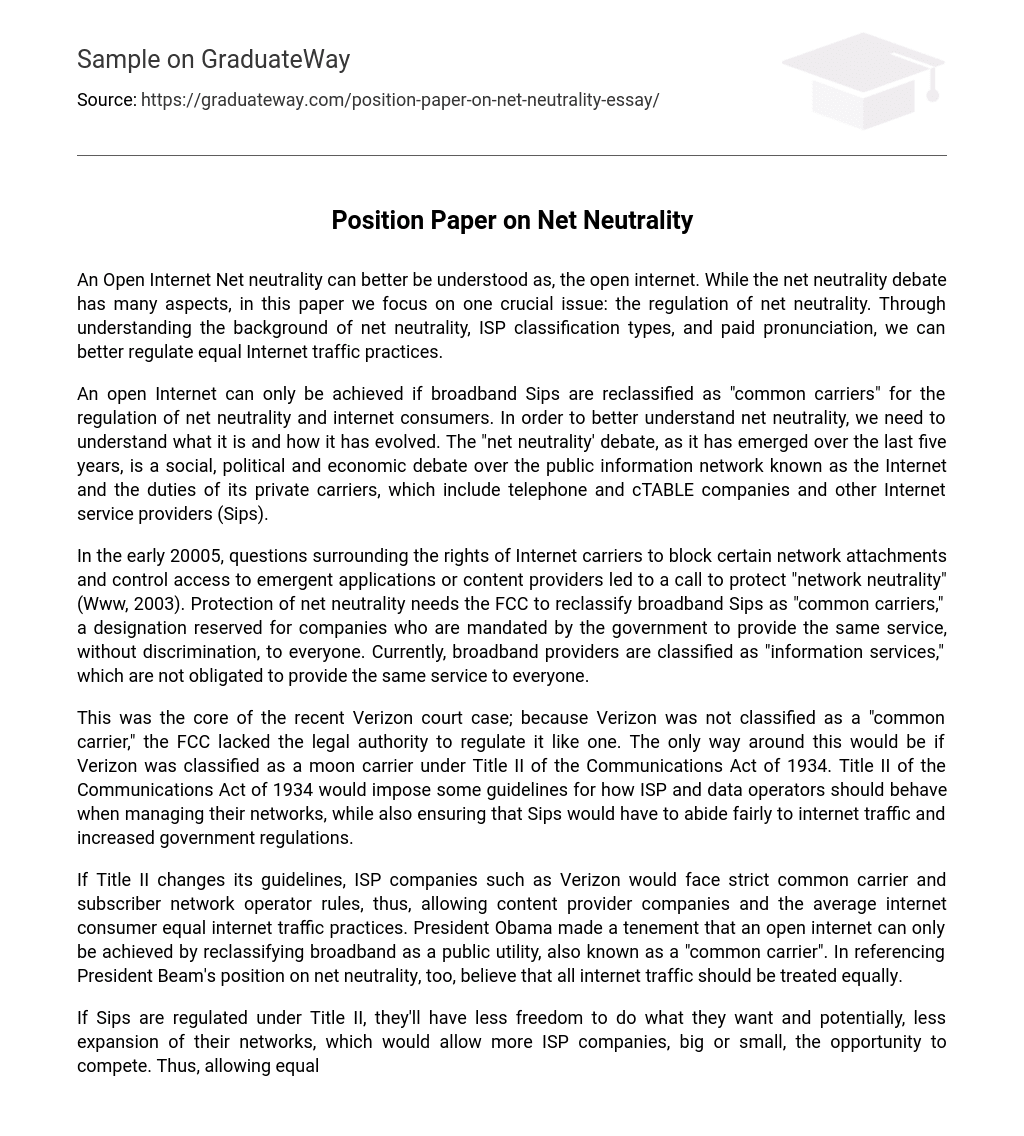An Open Internet Net neutrality can better be understood as, the open internet. While the net neutrality debate has many aspects, in this paper we focus on one crucial issue: the regulation of net neutrality. Through understanding the background of net neutrality, ISP classification types, and paid pronunciation, we can better regulate equal Internet traffic practices.
An open Internet can only be achieved if broadband Sips are reclassified as “common carriers” for the regulation of net neutrality and internet consumers. In order to better understand net neutrality, we need to understand what it is and how it has evolved. The “net neutrality’ debate, as it has emerged over the last five years, is a social, political and economic debate over the public information network known as the Internet and the duties of its private carriers, which include telephone and cTABLE companies and other Internet service providers (Sips).
In the early 20005, questions surrounding the rights of Internet carriers to block certain network attachments and control access to emergent applications or content providers led to a call to protect “network neutrality” (Www, 2003). Protection of net neutrality needs the FCC to reclassify broadband Sips as “common carriers,” a designation reserved for companies who are mandated by the government to provide the same service, without discrimination, to everyone. Currently, broadband providers are classified as “information services,” which are not obligated to provide the same service to everyone.
This was the core of the recent Verizon court case; because Verizon was not classified as a “common carrier,” the FCC lacked the legal authority to regulate it like one. The only way around this would be if Verizon was classified as a moon carrier under Title II of the Communications Act of 1934. Title II of the Communications Act of 1934 would impose some guidelines for how ISP and data operators should behave when managing their networks, while also ensuring that Sips would have to abide fairly to internet traffic and increased government regulations.
If Title II changes its guidelines, ISP companies such as Verizon would face strict common carrier and subscriber network operator rules, thus, allowing content provider companies and the average internet consumer equal internet traffic practices. President Obama made a tenement that an open internet can only be achieved by reclassifying broadband as a public utility, also known as a “common carrier”. In referencing President Beam’s position on net neutrality, too, believe that all internet traffic should be treated equally.
If Sips are regulated under Title II, they’ll have less freedom to do what they want and potentially, less expansion of their networks, which would allow more ISP companies, big or small, the opportunity to compete. Thus, allowing equal internet rails and regulation of net neutrality. Furthermore, classifying Sips as common carriers would allow he FCC to ban what’s known as “paid pronunciation. ” This term refers to Sips charging third party companies for speedier access to those Sips’ customers.
For example, if an internet consumer’s ISP is Verizon, and the consumer uses Nettling and FaceTABLE; Nettling pays Verizon to “prioritize” its traffic, while FaceTABLE does not, the internet consumer would most likely experience faster speeds on Nettling, than on FaceTABLE. An arrangement through paid pronunciation WOUld be great for Sips because they could prioritize their third party companies for speedier access, however that isn’t HTH kcal if the many is already paying to use the Sips access.
In that instance, it seems as the Sips are double-dipping on the third party company by charging for something the company is already paying for. Recently, this has actually happened. Nettling signed deals with Compact and Verizon to increase the speed and quality of their streaming video on both providers’ networks. While Nettling may be TABLE to afford to pay Sips for increased streaming speed, the same arrangement would not be attainTABLE for a much smaller competitor, and therefore because of paid pronunciation, the odds will never be in favor Of NY company trying to challenge the dominance of Sips.
Through classification status and the lack of competition they encounter because of nongovernmental regulations, America’s Sips are taking advantage of the system. Without competition from other Sips, eventually all internet consumers will be succumbed to the choices and practices one ISP Company will make. However, I am a firm believer that net neutrality needs to be first dealt with through government regulations and policies. Furthermore, without implementation of paid pronunciation, ISP companies will increase the mount of competitors they have, thus allowing more jobs, which could lead to a better economic society.
It has been estimated that regulation of net neutrality could impose a seven billion dollar a year overhead on the economy with a commensurate job impact of up to 70,000 jobs. In this instance, net neutrality would act like a tax on the Internet, imposing overhead on Sips and in turn, decreasing network investments, providing less opportunity for Sips. Net neutrality could manage competition by influencing the investment decisions of third party companies as well as internet nonusers which could have a significant positive impact on consumers, job growth, and the economy, in general.
Additionally, effective market competition will lead to more consumer choices, lower prices, more innovation, and more economic opportunity. Few would argue that the Internet is unbelievably important and that it needs nurture to continue to thrive. Through understanding the background of net neutrality, ISP classification types, and paid pronunciation, we can better regulate equal Internet traffic practices and cohesively acquire an open Internet through broadband ISP reclassification.
As we continue to approach this FCC net neutrality crossroads, there are many differing opinions on the best course of action to take, however after understanding how reclassification can cause regulations of net neutrality and create a better economic society, why would anyone oppose the regulation of net neutrality?





